| | 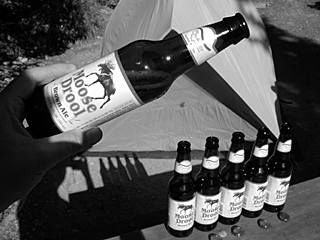
- 20 August 2001
- Moose Drool Economics
- Although I don’t like to encourage this sort of behavior, facts are facts. When you’re at Two Medicine Lake in Glacier National Park, the more—and faster—you drink, the more you save.
Take Moose Drool Brown Ale, for example. A single bottle costs one dollar and seventy-five cents. Six bottles cost only eight and a half dollars. Right away, you can save a couple of dollars by drinking six beers instead of one. And the math just gets better and better. The Two Medicine Lake store charges five cents a bottle deposit. So if you buy six bottles of Moose Drool Brown Ale at Two Medicine Lake but don’t finish drinking the last beer until, say, Boulder, Colorado, you’ve lost thirty big ones. And then there’s ice. Moose Drool Brown Ale is one of those adult beverages that tastes best when it’s cold. The usual procedure would be to put the beer in a cold mountain stream, but that’s not always an option in this dry year. (I discovered this yesterday when I hiked twelve kilometers up a canyon to discover a bone-dry creek bed.) The glaciers here are almost impossible to reach without technical climbing equipment, so that means paying a couple dollars for a bag of ice. Such an expenditure is unnecessary if the beers are consumed cold, which is why I now have six empty bottles of Moose Drool Brown Ale in front of me. Living out of a car, a pack, and a tent is both pleasant and inexpensive, given enough understanding of the mathematics involved. 
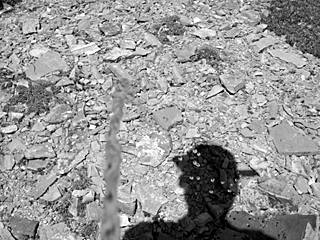
- 21 August 2001
- Continental Divide Considerations
- The continental divide runs through Glacier National Park; you can’t miss it. The continental divide is both a real boundary and an imagined line; I appreciate it mostly for its conceptual qualities.
Here’s how it works in theory. If you urinate on the continental divide, some of your urine will end up in the Pacific Ocean, and the remainder in the Atlantic Ocean. That’s the thought that was going through my bladder when I set free some of this morning’s espresso—and perhaps some of last night’s Moose Drool Brown Ale as well—when I reached Dawson Pass. The continental divide is an indistinct physical entity; there’s no clearly-defined ridge to guide the amateur mapologist. At Dawson Pass, I was able to target a fairly wide transcontinental area with my urine stream without even trying. The powerful winds passing through Dawson Pass scattered my urine everywhere, but not on me. (This wasn’t my first rodeo!) I very much enjoyed my time at Dawson Pass before moving on to Mount Helen. (Apologies to my Polish friend of the same given name.) Still, the ultimate Glacier National Park urination experience eludes me: Triple Divide Peak. In the unlikely event I should ever manage to urinate on Triple Divide Peak, part of my urine will, in theory, reach Hudson Bay, as well as the Atlantic and Pacific oceans. (Take that, you swarthy Canadians!) Hope springs eternal. 

- 22 August 2001
- Chili at Two Thousand, Six Hundred and Three Meters
- Some of my sophisticated San Francisco friends become stupefied with aghastness when they see me eat lunch on a chaotic day. When my busy schedule doesn’t allow me the luxury of one of the city’s myriad burrito parlors, I just whip out my Swiss army knife, a spoon, and a fresh can of Trader Joe’s Black Bean Chili.
Yum yum yummy! Even without the additional seasoning from a potent bottle of Fry Your Innards and Ferment Your Gizzards Hotter-Than-Hades Hot Sauce, Trader Joe’s Black Bean Chili tastes great fresh from the can. (I needn’t mention that the concoction is High in Fiber.) I’m afraid that my sophisticated San Francisco friends fail to appreciate the aesthetics of association. Take fish and chips, for example. If your only experience with that exceptional dish is to consume the frozen-then-microwaved variety, then you’ve never tasted real fish and chips, not even close. Do this: go to a small chippie on the coast of the North Sea in Scotland, order and eat a large order of fish and chips. Then go to a pub, drink four pints of your favorite bitter and/or stout, then snog a cute lass until the cows come home. That’s a real, unforgettable fish and chips experience. It’s the same with Trader Joe’s Black Bean Chili. Almost none of my sophisticated San Francisco friends can see that eating a can of cheap chili on a Sutter Street roof is an inexpensive flashback to sunny lunch high atop a mountain peak. 
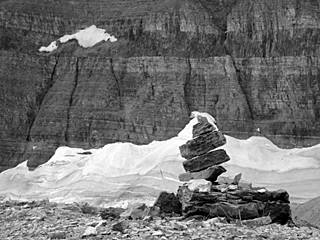
- 23 August 2001
- Shooting Cairns
- Hikers build cairns—small rock pyramids—in the mountains. Some cairns are functional: they indicate a trail across an indistinct landscape. Some cairns are triumphant: they mark a mountain peak. And some cairns are just plain whimsical: they mark the spot where someone decided to pile a bunch of rocks into a pyramid.
For years, I’ve considered making a series of photographs of cairns. What could be simpler? I just walk to the top of a mountain, pull out a Rolleiflex on a tripod, and presto! Done! But not quite. The first problem is deciding which cairns are proper mountaintop cairns, and which are functional or whimsical cairns. And since my audience won’t know the difference between a Mount This cairn and a Mount That cairn, perhaps I should fabricate the entire series in my studio. The “real versus faked” debate might perhaps be better be described as comparing authenticity to egotism. I have no problem” appropriating” the cairn builders’ work; what photographer worries about few little visual thefts here and there? Plagiarism seems like one of those diseases scientists eradicated way back in the twentieth century. And as for authenticity, who cares? Historians command huge salaries to decide such things. Egotism, though, is the domain of the artist, mostly. I think it would be wonderful to use my computer to fake a series of images of cairns atop the world’s highest mountains. Every part of the image, from the selection of the stones to the stacking to the final prints, would have been my doing. Would have, that is, if I weren’t so lazy. 
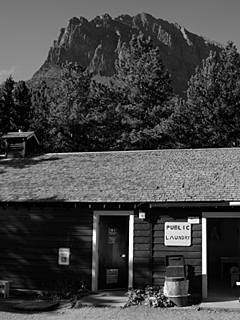
- 24 August 2001
- Derek and the Dominoes at Glacier National Park
- I met Derek and the Dominoes, sort of, at a drugstore in South Dakota in June, 1974. I bought the eight-track tape because it was on sale for a couple dollars, and had nice artwork.
And that’s why Derek and the Dominoes provided the music to my first glimpse of real mountains when my father and I drove up Going to the Sun Road in his 1972 Buick Riviera. Ever since then, I’ve never been able to listen to Derek and the Dominoes without thinking of the mountains in Glacier National Park. Until today, that is. I’m listening to all the songs that resonated so strongly over a quarter century ago while washing clothes at the Many Glacier Public Laundry Facility. (It’s the first place I’ve found with a spare outlet for my computer.) The Many Glacier Public Laundry Facility is the perfect time to listen to Derek and the Dominoes after all these years. From now on, I’ll think of the Many Glacier Public Laundry Facility instead of my first glimpse of real mountains, mountains that will never be that tall again. Life goes on. It’s just like Derek himself advised’ “Keep on growing; that’s all you have to do.” 
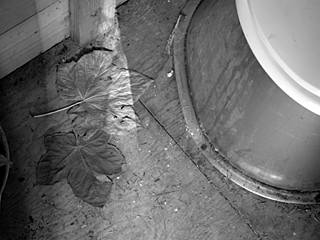
- 25 August 2001
- Two Leaves in an Outhouse
- In national parks, outhouses aren’t outhouses, they’re now called pit toilets. Although outhouses and pit toilets are equally unpleasant, I concede they’re a physical, mathematical, and biological necessity when even a relatively small number of people camp in the same area for a few consecutive months. This is, after all, 2001.
After hiking up Park Creek for a dozen kilometers, I came to an outhouse, er, pit toilet. Inside, someone had thoughtfully left a couple of large leaves, presumably in lieu of toilet paper. I left the leaves where I found them, and continued on my way. Some people take this “back to nature” stuff a little too far. This is, after all, 2001. 
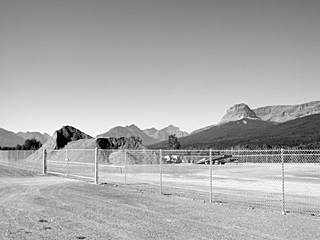
- 26 August 2001
- Glacier Nature/All Park
- The workers at the Montana Department of Transportation (Saint Mary Section) recently received a ten-thousand dollar award from the Montana State Arts Commission for their collaborative work, Glacier Nature/All Park.
Teddy, one of the workers, showed me a copy of their application, a work of art in itself. Here are some of my favorite excerpts. ... deconstructing the glaciers’ work into its most abstract manifestation, gravel ...... time-based, site-specific piece ... ... rejecting the rigid limitations of traditional sculptural materials ...
- And so on, and so forth.
Teddy said all they did was to push their entire inventory of the gravel they used for highway construction and maintenance into a big, mountainous pile, then get Teddy’s nephew—an art school graduate!—to write the grant application. Teddy’s nephew, who was working on commission, kept fifteen hundred dollars of the award, and the workers put the remainder into an end-of-the-week beer bash. Teddy said everyone had a new appreciation of contemporary art, and that some of his mates were talking with pals in the forest service about a new piece involving regularly-scheduled forest fires. Anyway you look at it, art’s big in Montana. 
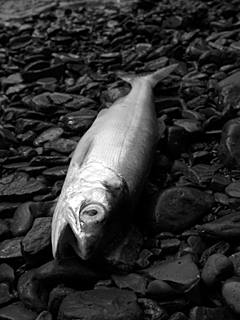
- 27 August 2001
- Caught and Released
- When I was a boy, I used to know a lot about fish. I even recall helpfully pointing out to an employee at the Shedd Aquarium in Chicago that one of the Latin names for a tropical fish engraved on a brass plaque by a large tank was incorrect. The civil servant gave terse thanks; to this day I still can’t understand why he didn’t kick me out.
I thought of my lost fishy knowledge today while looking through my Glacier snapshots in the comfort of the Blue Sky Motel (“Your Pillow in the Rockies”). I ran across a photograph of a dead fish I found on the shore of a mountain lake. I think it’s a trout, but that’s just from comparing the fish at hand with the topless and bottomless ones I’ve seen on dinner plates over the years. I don’t know much about fish anymore, but I do have a good idea of the cause of this fish’s demise. There’s a strange practice in Montana of “catch and release” fishing. Once you catch a fish, you remove the hook from the fish’s mangled mouth, then throw the creature back into the water. At the end of the day, the fisher presumably goes to a restaurant to dine on frozen fish from Iceland, while the trout tend to their wounds. Or, in the case of the fish I found, succumb to its fatal injuries. I don’t have many qualms about killing and eating a fish, but the practice of catching and releasing fish seems silly. At least that’s what I thought until I learned that all catch and release programs are not the same. Ray—or was it Tom?—Magliozzi pointed out that there’s nothing wrong with a catch and release program, as long as there’s a day or two between the catch and the release. I guess there’s more than one way of looking at just about anything. 
last weak | index | next weak
©2001 David Glenn Rinehart
| |

